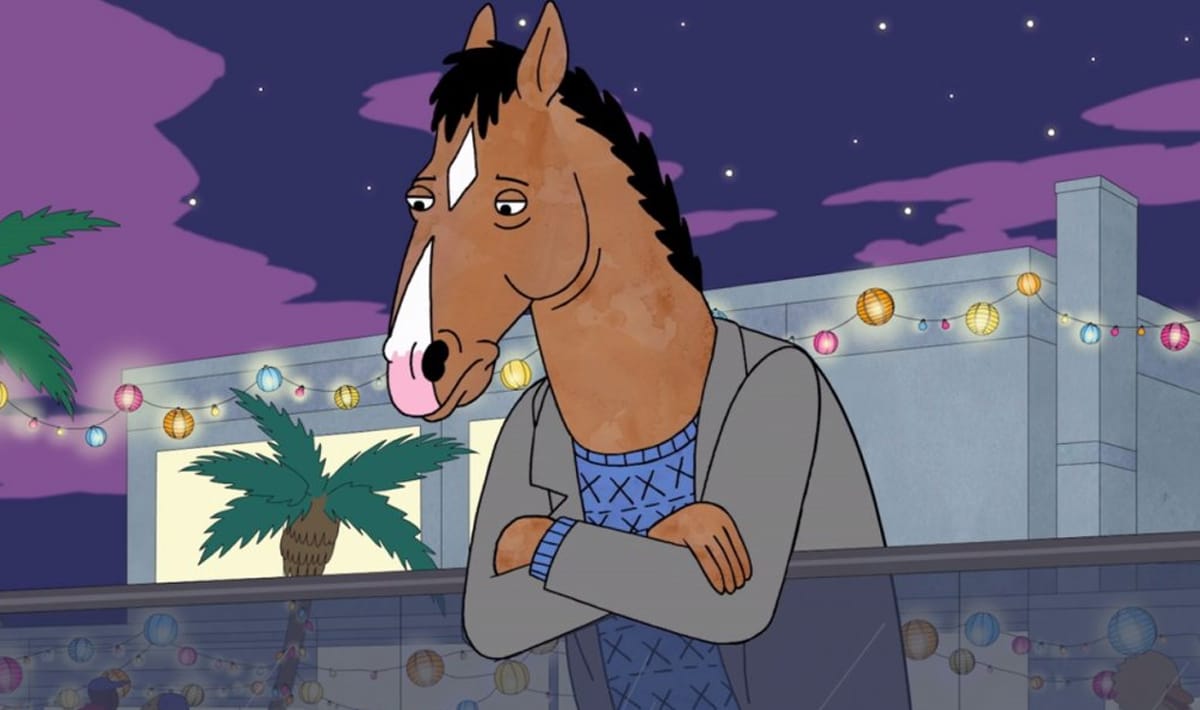It’s Been Quite a Ride: Bidding Farewell to “BoJack Horseman”

Note: this article intentionally avoids spoilers in this piece, so it appeals to a broader audience and convinces some new people to watch the show.
Part of the brilliance of Netflix’s “BoJack Horseman” is that it forces viewers to grapple with their own views regarding morality by presenting them with BoJack’s mistakes and making them question whether they’re rooting for him as a protagonist. Some of his actions are illegal, others creepy and some just plain weird, but for whateverreason, he keeps landing on his feet even as he hurts those around him.
In the third season of “BoJack Horseman,” loveable loser and couch-crasher Todd Chavez tells the titular character during a fight: “You are all the things that are wrong with you. It’s not the alcohol or the drugs or any of the shitty things that happened to you in your career or when you were a kid. It’s you.” Todd cuts through BoJack’s self-loathing attitude and tells him the truth he needs to hear. In Season 6 Part 2, we get to find out whether BoJack’s peers and world judge him in the same way that Todd does.
The final installment of the BoJack Horseman story plays out the tension of whether BoJack’s past will catch up to him, despite having become sober and making tangible changes in his life, by following a couple of journalists who are on the hunt to discover his past misdeeds. Season 6 also brings almost all of the character arcs that have developed across the life of the show to a close.
Viewers get to find out what happens with Diane Nguyen and her new boyfriend and are treated to an insightful and creative episode – á la “Stupid Piece of Sh*t” (Season 4, Episode 6) – that explores her process of writing while battling depression. Mr. Peanutbutter, who began the series as a punchline, takes concrete steps towards self-awareness in the final season, especially in the way he handles his relationship with his girlfriend.
In the first half of Season 6, the writers devote an entire episode (“The New Client”) to the challenges Princess Carolyn faces when raising her newly adopted porcupine baby. We get to find out if and how she manages her work-life balance.Some of the storylines even tie back around to each other, as Mr. Peanutbutter and Diane reconnect and reminisce on a heartfelt phone call.
The penultimate episode of the show takes fans and the eponymous character on a harrowing trip down memory lane. Its unconventional style recalls the other second-to-last episodes of other seasons and delves deep into BoJack’s psyche, while also posing existential questions. A word of advice – pay attention to the small details, some dialogic, others visual.
A strength of the final half-season is that it leaves some storylines unfinished and emphasizes moral and thematic ambiguity. Life is not as clean as in many television shows, and the creators of “BoJack Horseman” were always aware of that fact and sought to reflect it in their work. Writers Allison Tafel and Raphael Bob-Waksberg leave fans six seasons filled with complex characters, hilarious jokes and thoughtful reflections. Illustrator Lisa Hanawalt created a visually stunning world comprised of endless Easter eggs — the show is worth a second and third rewatch just to find these nuggets — one that works in harmony with the writers’ scripts to use the show’s unique format to its advantage, especially in episodes such as “Time’s Arrow” (S4 E11) and “The View From Halfway Down” (S6 E15).
As with any successful work of art, the conditions of “BoJack’s” synthesis will likely not be repeatable. The show was created in 2011, greenlighted by more open-minded and content-hungry Netflix executives, who have recently been less willing to approve unconventional original content.
It’s easy to overquote this show when discussing it because the quotes are relatable. However, one worth repeating appears in the final episode. Todd remarks to BoJack, in a classic example of the “BoJack” writers’ meta-awareness: “Isn’t the point of art less what people put into it and more what they get out of it?” It isn’t hard to find hundreds or even thousands of posts on Reddit and other online forums of people admitting how much “BoJack” helped them with their depression, made them feel less alone, made them feel more empowered about their sexual orientation or destigmatized their addictions and allowed them to get help. The point of “BoJack” was never to give definitive answers to moral questions but to explore all parts of life, whether it be the presence of honeydew in fruit salad, the trials and tribulations of divorce and the value of friendship.





Comments ()